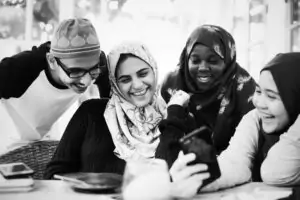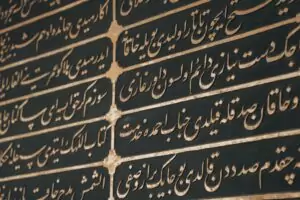Knowing how to greet people in a foreign language is a must, especially when building connections or showing respect to speakers of that language. Arabic, a rich and diverse language, boasts various greetings. In this article, we will delve into the most common ways to greet in Arabic, ensuring you’re well-prepared for any encounter with Arabic speakers.

✅ AI Essay Writer ✅ AI Detector ✅ Plagchecker ✅ Paraphraser
✅ Summarizer ✅ Citation Generator
8 Common Greetings in Arabic
Greeting in the Arabic language is rooted in deep cultural and religious traditions. Here’s a closer look:
| Arabic Greeting | Meaning & Usage |
|---|---|
| Sabaho (صباحو) | Meaning “Morning,” this casual greeting is for family or friends. Imagine meeting an old friend during a morning walk and saying, “Sabaho!” |
| Sabah el kheir (صباح الخير) | “Good morning,” suited for both formal and informal situations. A typical greeting for a boss or a sibling during a grocery run. |
| Sabah el noor (صباح النور) | Meaning “morning of the bright light,” it conveys wishes for a bright morning. Perfect for a friend you bump into during a morning stroll. |
| Yaseed sabahkom (يسعد صباحكم) | Translates to “may you have a nice morning.” It’s a universal greeting suitable before noon. The response? “Wa sabahkom,” meaning “and your morning.” |
| Sabah al Yasmine (صباح الياسمين) | Conveying a “morning full of jasmine,” this poetic greeting is used in romantic settings, perhaps with a significant other during a sunrise walk. |
| Sabah al ishta (صباح أل عشت) | An affectionate “morning full of cream” greeting, as poetic as “Sabah al Yasmine.” |
| Sabah el noum (صح النوم) | A playful “wakey, wakey” for someone who looks drowsy or has just woken up, like a co-worker dozing off. |
| Yaseed sabahak (يسعد صباحك) | “Have a happy morning,” with variations depending on gender. For men, women, and groups, the greetings are “Yeseed Sabahak,” “Yeseed Sabahek,” and “Yeseed Sabahkom” respectively. |
Other Arabic Greetings
Arabic has greetings that encompass various times of the day and scenarios:
| Arabic Greeting | Meaning & Usage |
|---|---|
| Ahlan wa sahlan (أهلا و سهلا) | A universal “welcome” or “hello” suitable for any setting, from family gatherings to business meetings. |
| Marhaba (مرحبا) | An informal “hello,” great for a café owner or an acquaintance met any time of the day. |
| Ahlan (أهلا) | A more casual “hi,” ideal for brief encounters like greeting a waiter. |
| Naharak Saa’id (نهارك سعيد) | Wishing someone a “good day,” it’s a versatile greeting for bosses to friends. |
| Yeseed masakom (يسعد مساكم) | Meant for evenings, it translates to “may you have a nice evening,” replied to with “Wa masakom.” |
| Sa’ide (سعيدي) | An informal nighttime “night” greeting to wind down the day. |
Differences in Greetings in Arabic Countries
Arabic countries, with their diverse cultures, have variations in greetings:
- Saudi Arabia 🇸🇦 – A nod or verbal greeting suffices. Physical greetings depend on gender and familiarity. Opposite genders avoid physical greetings, especially if a woman is in Hijab.
- Qatar 🇶🇦 – Handshakes between opposite genders happen if initiated by a woman. Same-gender formal greetings involve handshakes, but closer relationships might involve kisses on the cheek.
- UAE 🇦🇪 – Opposite genders opt for verbal greetings or handshakes initiated by women. Among relatives, nose touches or hugs are common.
- Egypt 🇪🇬 – Men may only shake hands with women if initiated by the woman; otherwise, a head bow suffices. Close friends or relatives might kiss on both cheeks.
- Lebanon 🇱🇧 – A handshake accompanied by “Hello” is standard. Regular acquaintances might share a cheek kiss.
- Jordan 🇯🇴 – Similar to Egypt, with the addition of placing a hand on one’s heart as a form of greeting.
- Syria 🇸🇾 – Formal greetings involve handshakes, while friends and family often exchange two to three cheek kisses.
- Morocco 🇲🇦 – Handshakes are common, with closer relationships involving kisses on both cheeks.

From poetic greetings that capture the essence of mornings to universal hellos, Arabic greetings are as varied as they are heartfelt. Embracing these greetings while respecting cultural nuances ensures meaningful connections in the Arab world, just like wondering how do you say bye in Arabic and applying your newfound knowledge to real-life situations. So, the next time you encounter an Arabic speaker, surprise them with a “Sabah el kheir” or a heartfelt “Marhaba,” and relish in the warmth and camaraderie that the language brings.
Follow us on Reddit for more insights and updates.





Comments (0)
Welcome to A*Help comments!
We’re all about debate and discussion at A*Help.
We value the diverse opinions of users, so you may find points of view that you don’t agree with. And that’s cool. However, there are certain things we’re not OK with: attempts to manipulate our data in any way, for example, or the posting of discriminative, offensive, hateful, or disparaging material.